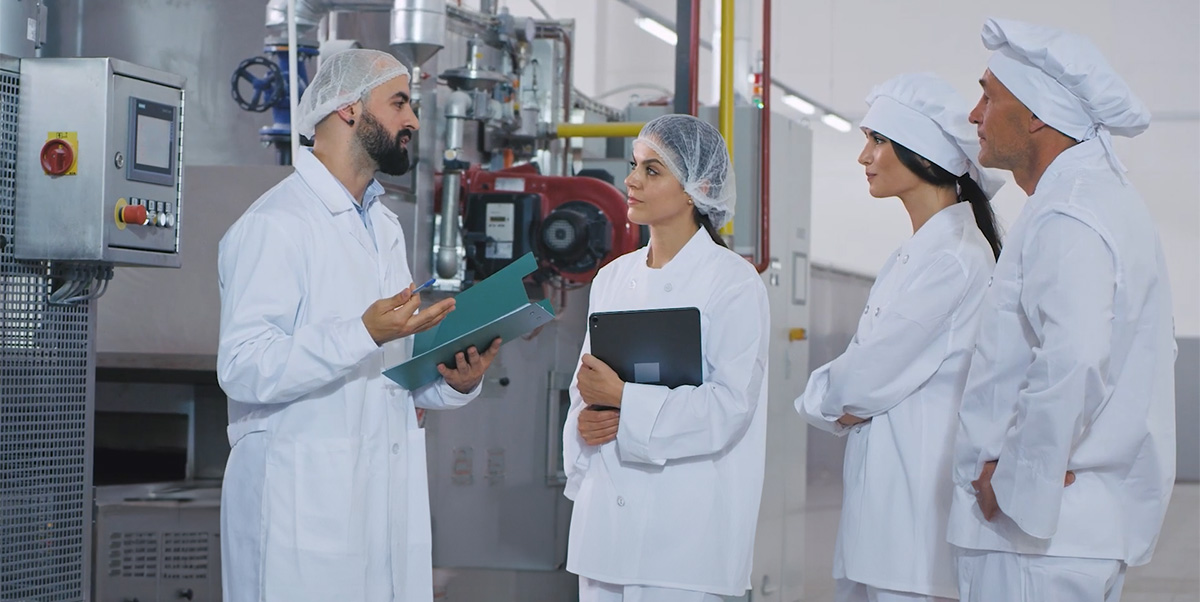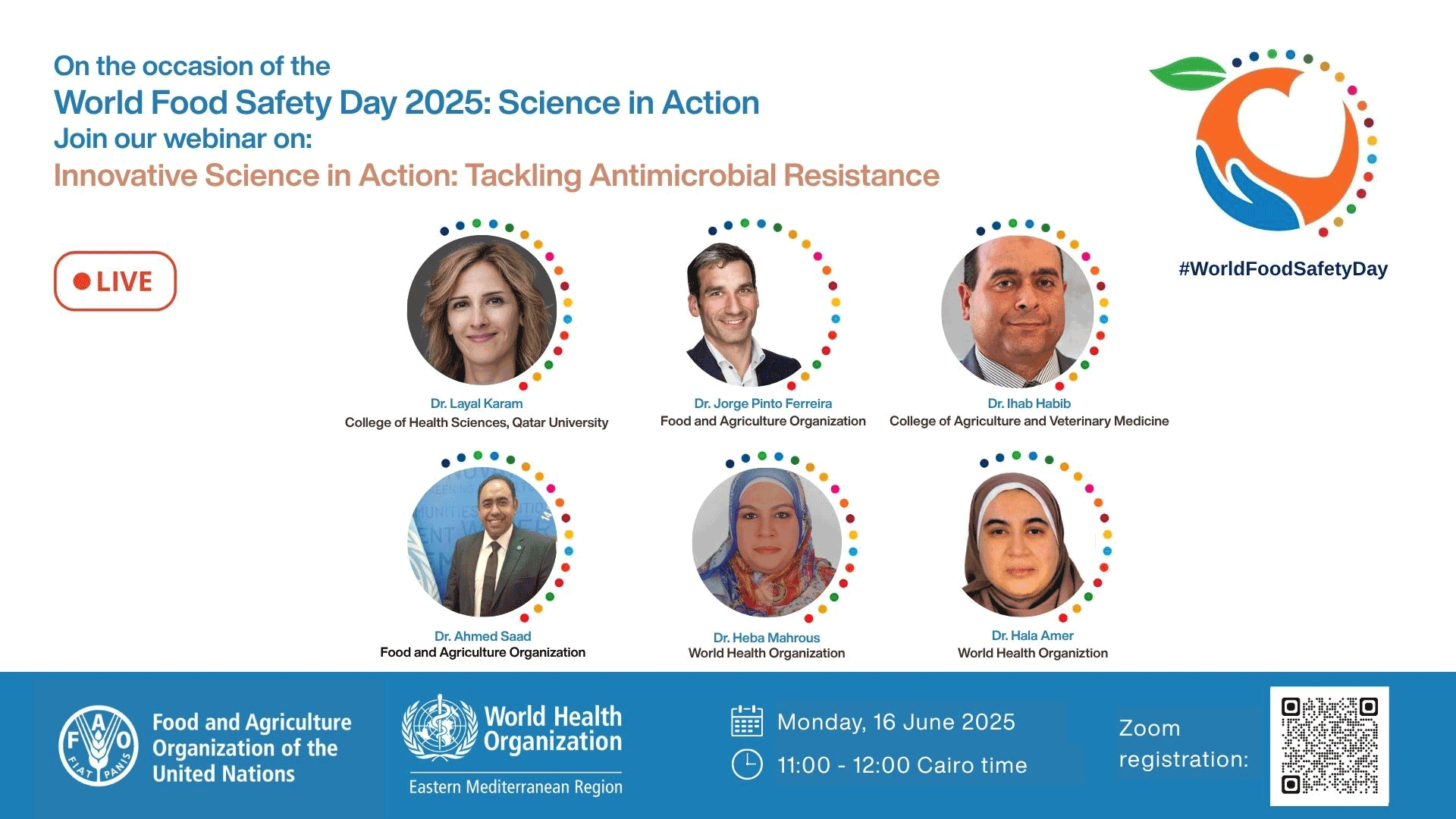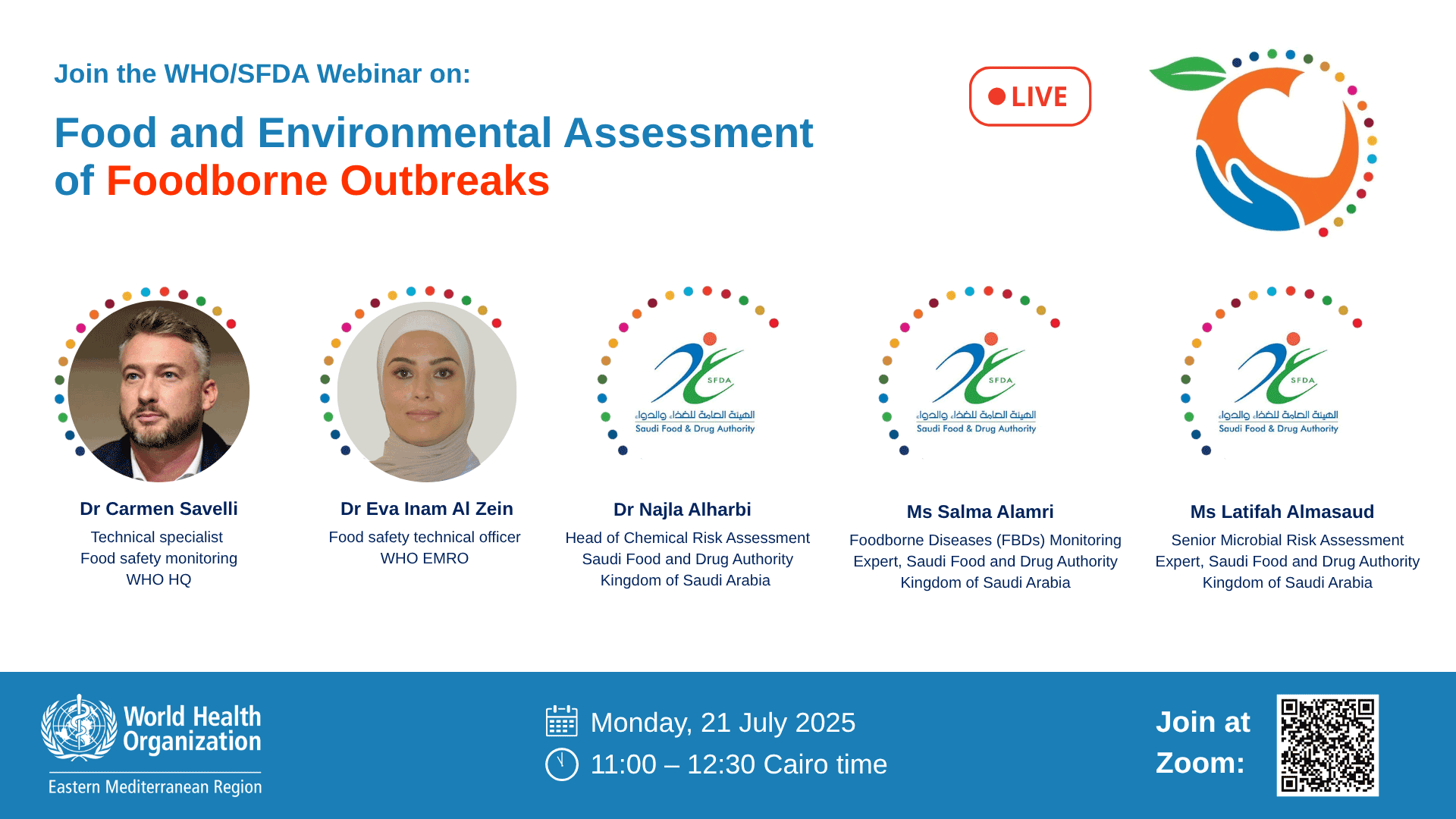
26 May 2025 – In today's interconnected food market, food safety is more important than ever. Safe food supplies are essential for health, contribute to food and nutrition security, support national economies, trade and tourism and underpin sustainable development.
World Food Safety Day, marked each year on 7 June, provides a platform to highlight the centrality of safe food to all our lives. Science in action, the theme of the 2024 campaign, underlines how scientific research underpins every aspect of food safety, from risk assessment and hazard analysis to the development of evidence-based policies and good practices.
Science generates the knowledge that enables policy-makers, food industry professionals and consumers to make informed choices that protect health.
To amplify the theme of this year’s World Food Safety Day, the World Health Organization (WHO) Regional Office for the Eastern Mediterranean and the Food and Agriculture (FAO) Regional Office for the Near East and North Africa is hosting a series of webinars from May to August 2025.
The webinars feature emerging topics presented by experts and aim to provide a comprehensive overview of evidence-based practices in food safety. They address current challenges and emerging trends, with a focus on promoting food safety and meeting the evolving needs of food safety professionals in the Eastern Mediterranean Region.
The webinar series aims to:
promote best practices to adopt and implement effective food safety measures;
build the capacities of food safety professionals on emerging food safety topics; and
develop a repository of webinar recordings and resources.
The target audience includes:
food safety professionals;
regulatory authorities;
food industry stakeholders; and
academics, researchers and students in food science and related fields.
Together, we can build a safer food environment for everyone.
|
Date |
Time (Cairo time) |
Title |
|
Monday, 26 May 2025 |
11:00–12:30 |
Empowering decisions through risk assessment and evidence-based strategies |
|
Monday, 2 June 2025 |
11:00–12:30 |
|
|
Monday, 16 June 2025 |
11:00–12:30 |
Innovative science in action: tackling antimicrobial resistance |
|
Monday, 23 June 2025 |
11:00–12:30 |
|
|
Monday, 14 July 2025 |
11:00–12:30 |
Building robust national food control systems: insights from the FAO/WHO Food Control System Assessment Tool |
|
Monday, 21 July 2025 |
11:00–12:30 |
|
|
Monday, 28 July 2025 |
11:00–12:30 |
Strengthening foodborne disease surveillance: determining capacities and identifying priorities |
Empowering decisions through risk assessment and evidence-based strategies
The webinar covers the role of science in food safety, risk assessment for safer food supplies and the role of international standards in ensuring food safety. Our experts discuss how to understand and assess risks from bacteria, chemicals and allergens in food, and how to develop effective control measures to prevent contamination during food production, processing and consumption.
Highlights
The importance of science in food safety:
understanding and assessing risks from bacteria, chemicals and allergens in food;
preventing contamination during food production, processing and consumption; and
setting evidence-based standards and regulations to ensure food safety across supply chains.
Risk assessment for safer food supplies:
utilizing the latest scientific research and data to inform decisions;
engaging with experts in food safety, nutrition and public health;
conducting thorough risk assessments to evaluate potential hazards and their impact on health; and
ensuring the scientific basis for decisions is transparent and accessible.
FAO/WHO Joint Expert Meetings on Microbiological Risk Assessment (JEMRA):
established in 2000 to respond to the Codex Committee on Food Hygiene;
conducts microbiological risk assessments and holds 1–4 meetings each year; and
influences Codex standards and national food safety measures.
Joint FAO/WHO Expert Committee on Food Additives (JECFA):
established in 1956 to evaluate the safety of food additives;
provides advice on food safety to FAO, WHO and Member States; and
develops standards based on evaluations, engaging experts from around the world.
Science-based Codex standards:
incorporate evolving scientific knowledge;
build credibility and trust in objective evidence;
protect public health by ensuring food safety; and
facilitate international trade by providing a common framework;
Future food safety challenges, including:
new food sources and production systems such as 3D food printing, precision fermentation and plant-based products;
the food safety hazards of new food production systems;
food safety in a circular economy, addressing issues such as food loss, water recycling and packaging waste; and
the impact of climate change on food safety.
Insights from Oman:
experience in translating science into action, with a focus on the titanium dioxide (TiO₂) ban.
Recommendations
1. Adopt science-based standards
Ensure that food safety standards are grounded in the latest scientific research to maintain credibility and trust.
2. Engage with experts
Collaborate with food safety, nutrition and public health experts to conduct comprehensive risk assessments.
3. Enhance transparency
Make the scientific basis for food safety decisions clear and accessible to build public trust.
4. Stay up to date with emerging technologies
Monitor and adapt to new food production systems and technologies to address food safety challenges.
5. Promote international collaboration
Work with international bodies like FAO and WHO to harmonize food safety standards and facilitate global trade.
6. Address climate change impacts
Develop strategies to mitigate the effects of climate change on food safety, including the use of environmental inhibitors for sustainable agriculture.
7. Implement effective control measures
Devise and enforce control measures to prevent contamination during all stages of food production, processing and consumption.
8. Learn from regional experiences
Utilize insights from other countries, such as Oman's response to the TiO₂ ban, to inform local food safety strategies.
You can access the full webinar recording by clicking the link below:
Missed a webinar? Watch the recording!
Passcode: Eu!?lQ2b
Risk-benefit assessment for informed decision-making
How risk-benefit assessments (RBA) assist in making decisions about food consumption that balance health benefits and safety risks.
Highlights
Introduction to Risk-Benefit Assessment (RBA):
evaluate the beneficial and adverse health effects of foods and diets.
Importance of RBA in food safety:
enhance the monitoring of foodborne hazards and implementation strategies to reduce contamination; and
generate evidence for policy formulation across nutrition, toxicology and microbiology.
Example case studies:
the health impact of replacing beef with pulses in Denmark and Portugal; and
evaluating fish consumption in terms of cardiovascular benefits versus chemical contaminant risks.
Methodologies and handling uncertainty:
best practice use of risk assessment methods and burden of disease studies.
Stakeholder involvement:
how stakeholders can help formulate questions, define consumption scenarios and translate knowledge into public health actions.
RBA use within WHO:
integrating nutrition, food safety and sustainability; and
guidelines on optimal intake of animal source foods.
FAO/WHO expert consultation on fish consumption:
the benefits of fish consumption for neurodevelopment and cardiovascular health; and
recommended strategies to minimize risks and maximize benefits from fish consumption.
Recommendations
1. Policy development
Use RBA to support the development of policies that align across nutrition, toxicology and microbiology.
2. Data collection and analysis
Collect and analyse data from the relevant literature, national surveys and other databases to support RBA, and develop and maintain databases on specific nutrients and food contaminants.
3. Risk management and communication
Develop risk management and communication strategies that minimize risks and maximize benefits from food consumption.
4. Stakeholder engagement
Engage stakeholders in identifying and formulating risk-benefit questions relevant to specific populations, collaborate with national experts and share data to strengthen the evidence base and facilitate the tailoring of global recommendations to local contexts.
5. Country involvement
Countries contribute case studies and share national data to refine tools and ensure adaptability to real-world settings; and
facilitate the active engagement of countries undergoing dietary transitions or facing data gaps with the goal of building impactful and inclusive outcomes.
Missed the webinar? Watch the recording!
Passcode: 5q#%e!1#
Innovative Science in Action: Tackling Antimicrobial Resistance

Monday, 16 June 2025
11:00–12:30 (Cairo time)
Register here: https://fao.zoom.us/webinar/register/WN_OwdiUc8TS6a8IX6uaTVvvA#/registration
Unveiling the science behind food safety laboratories
Explore the scientific foundations, technologies and global frameworks that empower food safety laboratories to protect public health.
Highlights
The role of food safety laboratories:
- serve as the first line of defence against foodborne illnesses;
- conduct routine monitoring, emergency diagnostics and risk assessments;
- enhance consumer protection and market access through reliable testing; and
- generate data for evidence-based policymaking, regulatory updates and consumer protection.
Technological advances:
- real-time PCR, whole genome sequencing, LC-MS/MS and ICP-MS for rapid, precise detection of pathogens, pesticide residues, heavy metals and veterinary drugs;
- AI and automation, including robotics, biosensors and machine learning for outbreak detection; and
- data systems, laboratory information management system (LIMS) and global networks like INFOSAN and PulseNet.
Global standards and frameworks:
- Codex Alimentarius Commission (CAC and international food safety standards;
- ISO/IEC 17025 and accreditation for laboratory competence; and
- The WTO SPS Agreement, harmonizing food safety measures for trade.
One Health Approach:
- integrates human, animal and environmental health;
- enhances early warning systems, outbreak tracing and antimicrobial resistance monitoring; and
- promotes cross-sector collaboration and data sharing.
Challenges and solutions
- Challenges include limited funding, outdated equipment and staff shortages.
- Solutions include portable testing kits, regional lab collaboration, digital platforms and international support (e.g., WHO, FAO).
Case studies from the Region:
- adoption of modern technologies like LC-MS/MS and real-time PCR for pesticide and pathogen detection in Egypt; and
- Qatar’s Scientific Framework for Ensuring Validity and Consistency in Food Testing to Support Evidence-Based Decision-Making.
Recommendations
1. Adopt cost-effective technologies
- Expand the use of real-time PCR, LC-MS/MS, ICP-MS and whole genome sequencing to improve detection speed, sensitivity and accuracy.
- Utilize portable rapid testing kits for field diagnostics (e.g., lateral flow assays, biosensors).
2. Strengthen quality assurance systems
- Ensure full compliance with ISO/IEC 17025 standards.
- Regularly conduct method validation, proficiency testing and equipment calibration.
- Implement robust data integrity protocols and a laboratory information management system for enhanced traceability and audit readiness.
3. Enhance workforce capacity
- Develop structured training programmes for lab personnel on new technologies, quality systems and data interpretation.
- Offer online certification programmes and remote mentoring to overcome geographic and financial barriers.
- Ensure basic digital literacy among staff to support data entry, analysis and reporting.
4. Promote policy integration
- Develop national food safety strategies that recognize the role of laboratories in public health and trade.
- Align testing protocols with Codex standards to facilitate international recognition and reduce redundant testing.
5. Foster interdisciplinary collaboration
- Strengthen the integration of public health, veterinary and environmental labs under the One Health framework.
- Actively engage with national and international agencies (e.g., FAO/WHO INFOSAN).
- Establish shared laboratory networks across neighbouring countries/regions to pool resources, expertise and equipment.
6. Improve risk-based surveillance
- Shift from random sampling to risk-based monitoring using historical data and trend analysis.
- Develop early warning systems for emerging hazards and antimicrobial resistance.
7. Support regulatory and trade compliance
- Align testing protocols with Codex Alimentarius standards.
- Provide certified test reports to facilitate international trade and reduce border re-testing.
8. Address operational challenges
- Secure sustainable funding for infrastructure, reagents and skilled personnel.
- Explore regional lab networks and shared services to optimize resources in low-resource settings.
9. Promote public transparency and trust
- Communicate food safety alerts clearly to the public.
- Engage in consumer education to raise awareness about food safety practices.
- Involve local stakeholders in sampling and surveillance efforts to improve coverage and trust.
Missed the webinar? Watch the recording!
Passcode: XX!Jxj2=
Food and environmental assessment of foodborne disease outbreaks

Missed the webinar? Watch the recording!
Passcode: r*+P3ukY
An examination of the crucial role food and environmental assessments play in identifying contamination sources and in halting/preventing outbreaks.
Highlights
- Foodborne diseases may range from self-limiting gastroenteritis to more severe conditions, such as bloody diarrhoea from Salmonella infection and neurological and muscular symptoms – muscle pain, tingling sensations and weakness – caused by ciguatera fish poisoning. For some foodborne diseases, such as botulism, a single case is considered an outbreak.
- The response to foodborne disease outbreaks relies on the integration of data from 3 key areas: epidemiology, laboratory diagnostics and food and environmental assessment. Triangulation combining data from each line of investigation enables accurate source identification.
- Food and environmental assessment actions include:
- traceback investigation of suspect food – detailed documentation of ingredients, production processes and distribution pathways;
- food business investigation – food preparation process review, observing food handling, temperature controls and sanitation at the time the contaminated food was produced;
- food handler interviews – identifying illness history and contamination risks;
- food and environmental sampling – collecting food, surface and water samples for lab analysis; and
- implementing control measures to stop the spread of illness.
- Microbiological and toxicological sciences play a crucial role in food safety. Climate sciences, social sciences and other disciplines also help in developing reliable and integrated policies and guidelines.
- Effective risk communication strategies play a central role in informing the public, preventing misinformation and facilitating cross-sectoral and cross-border coordination.
- Outbreak investigations identify gaps and areas that require strengthening, regulations and policies that need to be updated or developed, provide insights into how to develop workforce capacity-building programmes for improved preparedness and response to future outbreaks and help inform research in priority areas.
Example case studies
The Escherichia coli O104:H4 outbreak in Germany in 2011underlined the importance of early detection, cross-sector and multi-jurisdictional coordination and coordinated risk communication
The listeriosis outbreak in South Africa in 2017–2018 led to regulatory reforms and enhanced lab capacity.
The 2022 international case of Salmonella in chocolate highlighted the importance of global networks like the FAO/WHO International Food Safety Authorities Network (INFOSAN) in enabling countries to take action and implement risk management measures to remove contaminated food from domestic and international markets.
The Saudi Food and Drug Authority (SFDA) case study outlined key actions taken by SFDA to strengthen national foodborne disease surveillance and response to food safety incidents.
Challenges identified
Limited trained personnel and infrastructure
Fragmented data sources and limited appetite for sharing
Institutional overlaps and unclear mandates
Recommendations
- Build sustainable workforce capacity by:
conducting regular cross-sectoral training;
providing policy and infrastructure support;
strengthening international collaboration through networks such as INFOSAN; and
applying risk-based approaches aligned with Codex standards.
- Invest in technologies for rapid and accurate testing, including genomic sequencing.
- Develop, test and regularly update standardized protocols and SOPs, including for multisectoral coordination structures, assessment tools and methods.
- Improve data integration, sharing and interpretation.
- Adopt and implement risk-based approaches.
- Engage actively in global and regional networks.
- Promote cross-sectoral coordination and collaboration.
- Foster interdisciplinary research and innovation.
To access the full webinar, click the link. https://who-e.zoom.us/rec/share/sp36G1zwvCfZ3qD0y31l2tp9cVkLLuRLSJR3gMOcjNE67c3XVDtdR9f4Y14VNdT2.A3LILluDsnxn-__b
Passcode: r*+P3ukY
Strengthening foodborne disease surveillance: determining capacities and identifying priorities
Missed the webinar? Watch the recording!
Passcode: !S3t%sQ0
The session explored the global and regional status of foodborne disease (FBD) surveillance, the tools available to assess and strengthen national capacities, and the role of the WHO Alliance for Food Safety in building global and regional capacities through collaboration and knowledge sharing.
The global burden of foodborne diseases
Unsafe food causes over 200 diseases, ranging from diarrhea to cancer.
Globally, an estimated 600 million people fall ill, and 420,000 deaths occur annually.
Importance of foodborne disease surveillance
Strengthening national foodborne disease surveillance systems is critical to protect public health, promote economic prosperity, break the cycle of malnutrition, and contribute to global food security.
Robust national foodborne disease surveillance systems support the understanding of the effect of climate change on food safety to implement mitigation measures proactively. Promote scientific knowledge and support decision-making while enhancing multisectoral collaboration from a One Health lens.
Foodborne disease surveillance capacities globally
The global indicator for foodborne disease (FBD) surveillance was 1.5/5 in 2022.
Limited capacities hinder effective response and burden estimation.
WHO tools to determine capacities and identify priorities
A step-by-step guidance that helps countries to conduct self-assessments, identify gaps and priorities. Use decision trees to plan and map the next steps for implementation.
WHO Alliance for Food Safety
Launched in May 2024, it is formed of a global network of WHO Collaborating Centres and partners working together to drive a global initiative that:
Raises awareness about the importance of food safety
Mobilizes resources to support food safety programs
Fosters partnerships between WHO CCs, governments, international organizations, and other partners.
Conclusion
A safer and resilient global food supply depends on robust surveillance and response.
Establishing and strengthening national foodborne disease surveillance systems globally is critical for understanding and ultimately reducing the burden of foodborne diseases, in line with WHO’s Global Strategy for Food Safety.
WHO manuals offer a structured approach to strengthen national foodborne disease surveillance systems.




